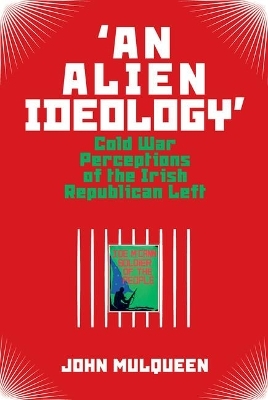
'An Alien Ideology'
Cold War Perceptions of the Irish Republican Left
Seiten
2022
Liverpool University Press (Verlag)
978-1-80085-473-4 (ISBN)
Liverpool University Press (Verlag)
978-1-80085-473-4 (ISBN)
- Lieferbar
- Versandkostenfrei
- Auch auf Rechnung
- Artikel merken
'[W]ell researched and thought-provoking... John Mulqueen has written an important book and has certainly contributed to rendering the Troubles less parochial.'
Jérôme aan de Wiel, Canadian Journal of Irish Studies
An ‘Irish Cuba’ – on Britain’s doorstep?
This book studies perceptions of the Soviet Union's influence over Irish revolutionaries during the Cold War. The Dublin authorities did not allow the Irish state’s non-aligned status to prevent them joining the West’s struggle against communism. Leading officials, such as Colonel Dan Bryan in G2, the Irish army intelligence directorate, argued that Ireland should assist the NATO powers. British and Irish officials believed communists in Ireland were directed by the British communist party, the CPGB.
If Moscow's express adherents were too isolated to pose a threat in either Irish jurisdiction, the republican movement was a different matter. The authorities, north and south, saw that a communist-influenced IRA had potential appeal. This Cold War nightmare arrived with the outbreak of the Northern Ireland Troubles. Whitehall feared Dublin could become a Russian espionage hub, with the Marxist-led Official IRA acting as a Soviet proxy. To what extent did the Official republican movement's Workers’ Party serve the Soviets’ Cold War agenda?
Jérôme aan de Wiel, Canadian Journal of Irish Studies
An ‘Irish Cuba’ – on Britain’s doorstep?
This book studies perceptions of the Soviet Union's influence over Irish revolutionaries during the Cold War. The Dublin authorities did not allow the Irish state’s non-aligned status to prevent them joining the West’s struggle against communism. Leading officials, such as Colonel Dan Bryan in G2, the Irish army intelligence directorate, argued that Ireland should assist the NATO powers. British and Irish officials believed communists in Ireland were directed by the British communist party, the CPGB.
If Moscow's express adherents were too isolated to pose a threat in either Irish jurisdiction, the republican movement was a different matter. The authorities, north and south, saw that a communist-influenced IRA had potential appeal. This Cold War nightmare arrived with the outbreak of the Northern Ireland Troubles. Whitehall feared Dublin could become a Russian espionage hub, with the Marxist-led Official IRA acting as a Soviet proxy. To what extent did the Official republican movement's Workers’ Party serve the Soviets’ Cold War agenda?
John Mulqueen holds a PhD from Trinity College Dublin and is the author of ‘Remembering and Forgetting: The Official Republican Movement, 1970–1982’, in Jim Smyth (ed.), Remembering the Troubles: Contesting the Recent Past in Northern Ireland (2017). He is a regular contributor to the Dublin Review of Books and has written for Intelligence and National Security and History Ireland.
Introduction
I. Communists: Ireland’s ‘fifth column’?
II. ‘Communists’, the IRA and the Northern Ireland crisis
III. A ‘near-Communist’ movement
IV. The KGB and Ireland
V. Left-wing republicans align with Moscow
VI. ‘A party of the extreme left’
VII. Soviet policies in Dáil Éireann
VIII. Epilogue
Conclusion
| Erscheinungsdatum | 21.03.2022 |
|---|---|
| Verlagsort | Liverpool |
| Sprache | englisch |
| Maße | 156 x 234 mm |
| Themenwelt | Geschichte ► Allgemeine Geschichte ► Zeitgeschichte |
| Geisteswissenschaften ► Geschichte ► Regional- / Ländergeschichte | |
| ISBN-10 | 1-80085-473-0 / 1800854730 |
| ISBN-13 | 978-1-80085-473-4 / 9781800854734 |
| Zustand | Neuware |
| Haben Sie eine Frage zum Produkt? |
Mehr entdecken
aus dem Bereich
aus dem Bereich
Gewalt, Umwelt, Identität, Methode
Buch | Softcover (2024)
Spector Books OHG (Verlag)
CHF 49,95
wie Freud im Kollektiv verschwand
Buch | Hardcover (2024)
Klett-Cotta (Verlag)
CHF 34,95


